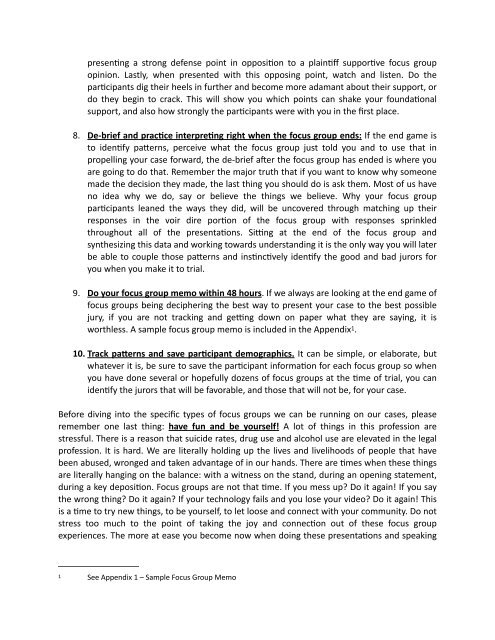FOCUS GROUPS BOOK
Create successful ePaper yourself
Turn your PDF publications into a flip-book with our unique Google optimized e-Paper software.
presenIng a strong defense point in opposiIon to a plainIff supporIve focus group<br />
opinion. Lastly, when presented with this opposing point, watch and listen. Do the<br />
parIcipants dig their heels in further and become more adamant about their support, or<br />
do they begin to crack. This will show you which points can shake your foundaIonal<br />
support, and also how strongly the parIcipants were with you in the first place.<br />
8. De-brief and prac6ce interpre6ng right when the focus group ends: If the end game is<br />
to idenIfy paPerns, perceive what the focus group just told you and to use that in<br />
propelling your case forward, the de-brief aNer the focus group has ended is where you<br />
are going to do that. Remember the major truth that if you want to know why someone<br />
made the decision they made, the last thing you should do is ask them. Most of us have<br />
no idea why we do, say or believe the things we believe. Why your focus group<br />
parIcipants leaned the ways they did, will be uncovered through matching up their<br />
responses in the voir dire porIon of the focus group with responses sprinkled<br />
throughout all of the presentaIons. SiZng at the end of the focus group and<br />
synthesizing this data and working towards understanding it is the only way you will later<br />
be able to couple those paPerns and insIncIvely idenIfy the good and bad jurors for<br />
you when you make it to trial.<br />
9. Do your focus group memo within 48 hours. If we always are looking at the end game of<br />
focus groups being deciphering the best way to present your case to the best possible<br />
jury, if you are not tracking and geZng down on paper what they are saying, it is<br />
worthless. A sample focus group memo is included in the Appendix 1.<br />
10. Track paYerns and save par6cipant demographics. It can be simple, or elaborate, but<br />
whatever it is, be sure to save the parIcipant informaIon for each focus group so when<br />
you have done several or hopefully dozens of focus groups at the Ime of trial, you can<br />
idenIfy the jurors that will be favorable, and those that will not be, for your case.<br />
Before diving into the specific types of focus groups we can be running on our cases, please<br />
remember one last thing: have fun and be yourself! A lot of things in this profession are<br />
stressful. There is a reason that suicide rates, drug use and alcohol use are elevated in the legal<br />
profession. It is hard. We are literally holding up the lives and livelihoods of people that have<br />
been abused, wronged and taken advantage of in our hands. There are Imes when these things<br />
are literally hanging on the balance: with a witness on the stand, during an opening statement,<br />
during a key deposiIon. Focus groups are not that Ime. If you mess up? Do it again! If you say<br />
the wrong thing? Do it again? If your technology fails and you lose your video? Do it again! This<br />
is a Ime to try new things, to be yourself, to let loose and connect with your community. Do not<br />
stress too much to the point of taking the joy and connecIon out of these focus group<br />
experiences. The more at ease you become now when doing these presentaIons and speaking<br />
1<br />
See Appendix 1 – Sample Focus Group Memo






